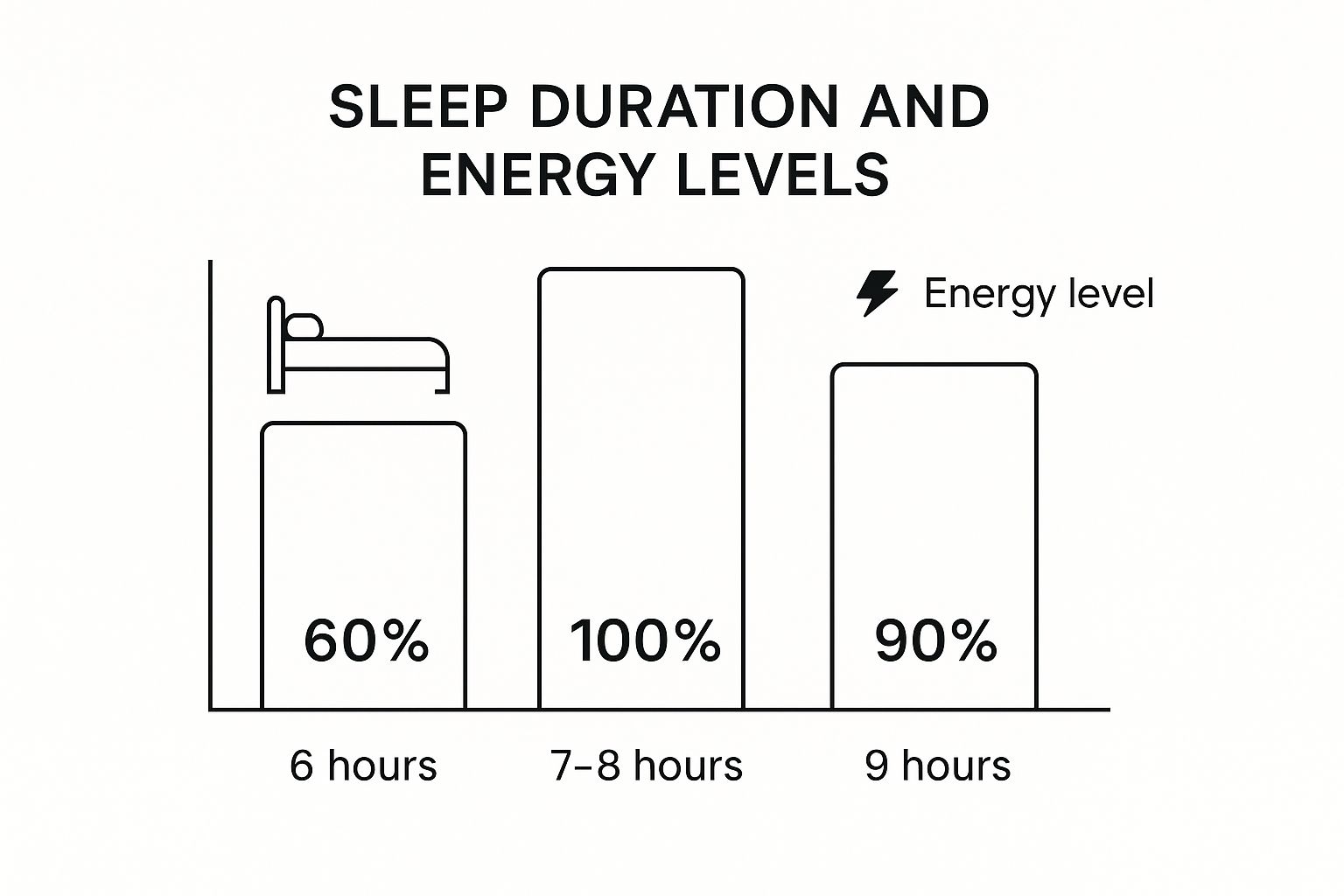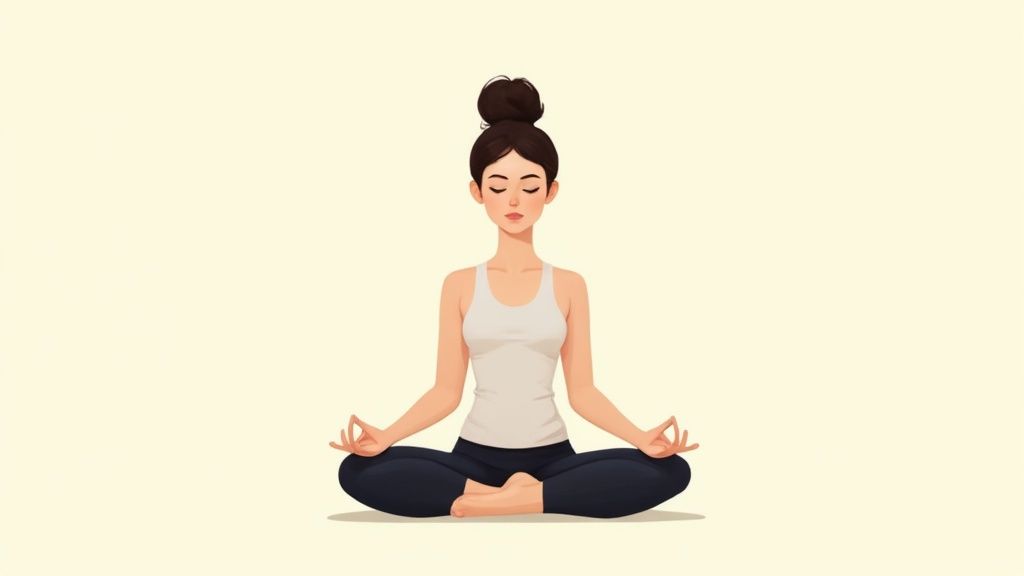How to Increase Energy Levels Naturally: Top Tips & Tricks

If you're wondering how to boost your energy naturally, the answer isn't some magic pill or an extreme diet. It's about making small, consistent tweaks to your daily life—what you eat, how you sleep, and the way you move. The goal is to build sustainable habits that deliver real energy, not the fleeting buzz from sugar and caffeine that always ends in a crash.
Your Starting Point for Natural Energy

Feeling constantly drained is something so many of us struggle with. The good news? You can absolutely reclaim your vitality without chugging energy drinks. The secret lies in building a solid foundation from four core areas that work together to fuel your body and mind.
Think of this as your practical roadmap, not a massive, intimidating overhaul. We're talking about small adjustments that create real momentum over time.
The Four Pillars of Natural Energy
To get started, we need to address the root causes of fatigue. By focusing on these four pillars, you'll create a powerful, self-sustaining system for all-day energy.
To give you a clearer picture, here's a quick summary of how these pillars work together to build lasting vitality.
Core Pillars for Boosting Natural Energy
| Pillar | Key Focus | Primary Benefit |
|---|---|---|
| Fueling Your Body | Shifting from processed junk to nutrient-dense whole foods. | Steady, crash-free energy instead of sugar-fueled spikes and dips. |
| Mastering Sleep | Aiming for 7-9 hours of quality, uninterrupted rest. | Deep physical and mental restoration, plus balanced energy-regulating hormones. |
| Intelligent Movement | Integrating consistent physical activity into your routine. | Improved circulation and more efficient cellular energy production. |
| Managing Stress | Using simple techniques to calm your nervous system. | Protecting your mental and physical reserves from being constantly depleted. |
These pillars aren't independent; they support and amplify one another. For example, better sleep makes it easier to manage stress, and more energy from good food makes you actually want to move your body.
The biggest mistake I see people make is searching for energy in a coffee cup or an energy drink. True, lasting energy isn't found—it's built. It comes from the inside out when you give your body what it truly needs.
From Tired to Energized
It sounds a bit backward, but one of the best ways to get more energy is to use energy through exercise. When you're physically active, your body responds by increasing the number of mitochondria in your cells—these are your body's tiny energy factories.
Even something as simple as a brisk, 30-minute walk five times a week can make a huge difference in your vitality. If you’re curious about how this principle of efficient energy works on a larger scale, you can explore how countries are prioritizing sustainable energy.
This guide will walk you through exactly how to put these pillars into practice. We’ll cover simple, actionable advice to help you go from feeling perpetually exhausted to waking up refreshed and ready to take on your day.
Eat for Energy: How to Fuel Your Body the Right Way
If you're constantly wondering how to get more energy, the first place to look is your plate. What you eat is, without a doubt, the biggest lever you can pull to change your daily energy levels.
Think of it this way: you can't expect to feel vibrant and focused if you're running on fumes. The quick fix from a candy bar or an energy drink is a trap. It gives you a fleeting high, followed by a hard crash that leaves you feeling worse than before. Real, lasting energy doesn't come from a can; it comes from whole foods that provide a steady, reliable power source.
Choose Carbs That Go the Distance
Not all carbs are created equal. This is probably the most important concept to grasp when you're eating for energy.
Simple carbs—the kind you find in white bread, pastries, and sugary sodas—hit your system like a flash flood. They cause a massive, rapid spike in your blood sugar. It feels good for a minute, but the subsequent crash is what causes that classic 3 PM slump. You’re left tired, foggy, and craving more sugar.
Your best bet for all-day energy is complex carbohydrates. These are the good guys. Because they're packed with fiber, your body digests them slowly. This means you get a steady, controlled release of energy over several hours, keeping you on an even keel.
Here are some of my go-to complex carbs:
- Sweet Potatoes: They're delicious, versatile, and loaded with fiber and vitamins.
- Quinoa: A true powerhouse. It's a complex carb that also happens to be a complete protein.
- Oats: A classic breakfast for a reason. A bowl of oatmeal provides slow-burning fuel to kickstart your day.
- Brown Rice: An easy swap from white rice that adds a ton of fiber and nutrients.
- Legumes: Think lentils, chickpeas, and black beans. They’re fantastic sources of both carbs and protein.
Research often points to foods like yams and sweet potatoes as being particularly good for stable energy, largely due to their high fiber content slowing down how quickly your body absorbs the carbs. You can dig deeper into the science behind energy-boosting foods on Medical News Today.
Don't Forget Protein and Healthy Fats
While carbs are your body's main fuel, protein and healthy fats are the essential support crew. Protein does more than just build muscle; it helps you feel full and satisfied, which is key to preventing you from reaching for those sugary, energy-draining snacks.
Good protein sources to work into your meals include:
- Lean meats like chicken and turkey
- Fish, especially fatty fish like salmon (you get the bonus of omega-3s!)
- Eggs
- Greek yogurt
- Lentils and beans
Healthy fats, from foods like avocados, nuts, and olive oil, also help with satiety and provide a very long-lasting, slow-burn energy source. A perfect example of a balanced, energy-boosting snack is an apple with a spoonful of almond butter. It has the complex carbs from the apple, plus the protein and healthy fat from the almond butter. It's a winning combination.
The Tiny Powerhouses: Micronutrients
You could get your carbs, protein, and fat macros perfectly balanced, but if you're low on key micronutrients, you'll still feel drained. Specific vitamins and minerals are absolutely critical for converting the food you eat into energy your cells can actually use.
You wouldn’t expect a car to run without oil, spark plugs, and coolant. Likewise, your body needs micronutrients like iron and B vitamins to convert the fuel you give it into actual, usable energy.
Iron is a big one. It's responsible for carrying oxygen in your blood, and even a mild deficiency can lead directly to fatigue. You can find it in spinach, red meat, and lentils. The B vitamins, especially B12, are famous for their role in energy production. They're found in abundance in whole grains, eggs, and meat.
Making these changes can feel like a huge project, but it doesn't have to be. Start small. Just swapping your morning muffin for a bowl of oatmeal is a fantastic first step. Cutting back on sugar is one of the most powerful changes you can make, and you can learn all about the benefits of quitting sugar in our guide. Remember, this is all about progress, not perfection.
Mastering Sleep for All-Day Vitality

While food is the fuel, sleep is where the real magic happens. It’s when your body and brain get to work repairing, recharging, and getting you ready for the day ahead.
If you’re constantly waking up feeling like you haven’t slept a wink, your sleep habits are the first place to look. It’s not just about being in bed for a set number of hours. It’s about the quality of that rest.
Skimping on sleep and getting less than the recommended 7-9 hours a night throws your entire system off balance. It messes with the hormones that control your appetite and energy, slows your metabolism right down, and tanks your focus and mood. This isn’t just in your head; it’s a biological fact.
Create Your Sleep Sanctuary
The room you sleep in has a huge impact on your rest. I’ve found it helps to think of your bedroom as a sanctuary dedicated to one thing: sleep. It’s not an office, a movie theater, or a social media hub. When you walk in, your brain should get the signal that it's time to power down.
Here’s how to turn your room into the perfect sleep environment:
- Make it dark. And I mean really dark. Even tiny bits of light from a charging phone or a streetlamp can mess with melatonin, the hormone that tells your body it's time for sleep. Blackout curtains are your best friend here, or a comfy eye mask can do the trick.
- Keep it quiet. Sudden noises are notorious for yanking you out of deep, restorative sleep. If you live in a noisy area, a white noise machine or even a simple fan can create a consistent, soothing backdrop. Earplugs are a great low-tech option, too.
- Stay cool. Your body temperature naturally needs to drop to initiate sleep. Keeping your bedroom on the cool side—ideally between 60-67°F (15-19°C)—helps this process along and encourages you to stay asleep.
The Power of a Wind-Down Routine
What you do in the hour before bed can make or break your night. If you spend that time frantically answering emails or scrolling through social media, you’re keeping your mind wired and exposing yourself to blue light, which actively blocks that all-important melatonin.
I used to scroll through my phone in bed every night, thinking it helped me relax. I'd fall asleep eventually but always woke up groggy. Swapping my phone for a physical book for just 30 minutes before lights out was a game-changer. I fell asleep faster and woke up feeling genuinely refreshed.
This small shift can have a massive payoff. Building a simple, relaxing pre-sleep ritual is like giving your body a heads-up that rest is coming. Try some light reading, gentle stretching, or listening to calm music.
The connection between poor sleep and daytime fatigue is impossible to ignore. It’s one of the top causes of low energy, with data showing that over a third of adults in the U.S. don't get enough sleep. Research has consistently shown that when people build better sleep habits, they can gain almost an extra hour of sleep per night. That added rest translates directly into more energy the next day. You can dig into one of the studies about how sleep hygiene impacts energy levels to see the data for yourself.
Get Moving to Find Your Spark
It feels completely counterintuitive, right? When you’re bone-tired, the last thing you want to do is get up and move. But here’s the secret: expending a little energy through physical activity is one of the best ways to create more energy. The key is what I call “smart movement”—finding something you actually like to do, so it doesn't feel like a chore. This is how you break out of that exhaustion cycle for good.
The science here is pretty cool. When you exercise, you get your blood pumping, which sends a rush of oxygen and nutrients to your brain and muscles. But it goes deeper. Regular activity actually tells your body to build more mitochondria. Think of these as the tiny power plants inside your cells that produce energy. So, more mitochondria literally means you have a bigger, more efficient engine to run on all day.
Start Where You Are, Not Where You Think You Should Be
If the thought of a workout makes you want to crawl back into bed, listen up. The goal isn't to run a marathon tomorrow. It's simply to build a small, consistent habit that leaves you feeling energized, not wiped out.
Honestly, a brisk walk is a fantastic place to start. Just 10-15 minutes is enough to give you an energy boost that can last for a couple of hours. Once that feels good, you can slowly build up to 30 minutes.
Here are a few practical ways I sneak movement into even my most sluggish days:
- The Midday Reset: Ditch eating at your desk. Take a quick walk around the block during your lunch break. The change of scenery and fresh air work wonders on that classic afternoon slump.
- A Gentle Unwind: Restorative yoga is my go-to when I'm mentally fried. It’s all about gentle stretching and breathing, which is surprisingly energizing without the high-impact stress.
- Strength for Stamina: Don't overlook strength training. A few sets of bodyweight exercises like squats or push-ups, or lifting some weights, revs up your metabolism. A higher metabolic rate means you burn more energy even at rest, leading to more sustained power throughout the day.
It took me years to figure this out, but exercise doesn't have to be a punishment. I used to force myself to go running, and I dreaded every second. Now, I just pop in a podcast and go for a long walk. It’s something I actually look forward to, and the mental clarity and physical energy I gain are just incredible bonuses.
Find Your Energizing Movement
Not all movement is created equal. The best activity for you depends on your current energy levels and what you need at that moment. Sometimes you need a gentle nudge, other times a more vigorous push.
This table can help you match an activity to your energy needs.
| Activity Type | Intensity | Best For | Energy Benefit |
|---|---|---|---|
| Walking | Low | Getting started, clearing your head | Quick, accessible boost and mood lift. |
| Yoga/Stretching | Low-Medium | Reducing stress, increasing flexibility | Calms the nervous system and eases tension. |
| Strength Training | Medium-High | Building a metabolic baseline | Increases long-term, sustained energy. |
| Dancing | Varies | Having fun, boosting your mood | The joy factor is a powerful energizer itself. |
| Cycling/HIIT | High | A quick, powerful energy jolt | Excellent for cardiovascular health and a fast endorphin rush. |
The most effective workout is the one you'll actually do consistently. Experiment a bit and see what clicks for you.
How Movement and Sleep Create an Upward Spiral
Smart movement also has a massive impact on your sleep quality, which creates this amazing positive feedback loop. When you move your body regularly, you tend to fall asleep faster and get more of that deep, restorative rest your body craves.
Of course, that means you wake up with more energy to tackle your day—and maybe even feel more motivated to move again. It all works together.

As this chart shows, there’s a real sweet spot. Nailing that 7-8 hours of sleep is what allows your body and mind to function at 100%. Too little sleep (or even too much) can leave you feeling foggy and drained. Weaving enjoyable movement into your daily routine is one of the most reliable ways to regulate your sleep and finally tap into your full energy potential.
How to Stop Stress from Draining Your Energy

It’s no secret that chronic stress is an absolute energy vampire. When you’re constantly on edge, your body is stuck in "fight or flight" mode, pumping out stress hormones like cortisol. This high-alert state is exhausting, slowly draining your physical and mental resources until you feel completely spent.
Think of your daily energy as a phone battery. Every stressful meeting, tight deadline, and anxious thought pulls from its charge. To keep that battery full, you need practical ways to stop the drain and, more importantly, to recharge.
Calm Your Nervous System Instantly
You don't need a full hour of meditation to feel better. Simple, quick mindfulness techniques can pull your nervous system out of that panicked state almost immediately. One of the most powerful tools I’ve personally used is box breathing. It's so easy you can do it at your desk, in your car, or even in a crowded room.
Here’s the simple pattern:
- Breathe in slowly through your nose for four seconds.
- Hold that breath for four seconds.
- Exhale slowly through your mouth for four seconds.
- Hold your breath again for four seconds.
Just a few rounds of this—say, four or five times—is enough to make a difference. This exercise forces your breathing to slow down, sending a powerful signal to your brain that the immediate danger has passed and it’s okay to relax.
When we're stressed, what's the first thing we often reach for? Sugar. It's a quick-fix comfort that only makes the energy rollercoaster worse by causing sharp spikes and even sharper crashes. Breaking this cycle starts with understanding why stress triggers cravings. You can learn more about what to expect by exploring these common sugar withdrawal symptoms and their impact on your mood.
Build Your Stress Buffers
While quick fixes are great for in-the-moment relief, building long-term resilience is about creating protective buffers. These are the habits and activities that consistently refill your energy tank and act as a release valve for all that built-up daily pressure.
What works as a buffer is deeply personal. For some, it’s a 20-minute walk in a park; research on "forest bathing" shows it can tangibly lower cortisol. For others, it’s a phone call with a good friend or getting lost in a creative hobby like painting or playing guitar.
The real game-changer is scheduling these activities into your week before you feel burnt out. Treat them like non-negotiable appointments. This also means setting firm boundaries, like turning off work notifications after 6 PM or feeling empowered to say "no" to plans when you know you need to rest. This isn’t selfish—it's essential energy management.
Build High-Energy Habits That Actually Stick
If you want to make a real, lasting change in your energy levels, you have to get personal. Generic advice can only take you so far. The real magic happens when you start connecting the dots between your daily choices and how you actually feel.
This is where a little bit of tracking becomes your secret weapon. I'm not talking about obsessive calorie counting or complicated spreadsheets. It's about paying attention and gathering clues. For instance, you might notice that every time you grab that specific "healthy" sandwich for lunch, you crash hard around 3 PM. Without tracking, that's just a vague feeling. With tracking, it's a clear signal you can act on.
Turn Vague Goals into Concrete Actions
The whole point is to move from a fuzzy goal like "I want more energy" to knowing exactly what steps will get you there. This is where an app like StopSugar can really help, by showing you the direct link between your food choices and your day-to-day vitality.
By using a simple daily check-in, for example, you can quickly see how a day filled with hidden sugars lines up perfectly with feelings of fatigue or irritability.
That visual feedback makes the connection between what you eat and how you feel impossible to ignore. It turns the abstract idea of "eating better" into a crystal-clear pattern of cause and effect, which is incredibly motivating.
Tracking isn't about judgment or perfection. It's about awareness. It’s like turning a light on in a dark room—suddenly, you can see the obstacles that were tripping you up all along.
This creates a powerful positive feedback loop. You spot a food that drains your energy, you cut it out, and you immediately feel better. That tangible improvement makes you want to keep going and find the next small win.
This process isn't just about restriction; it's about discovery. As you phase out the foods that leave you sluggish, you create space to bring in delicious, energizing alternatives. For some great ideas to get you started, check out our guide to no-sugar diet recipes. By focusing on awareness and swapping things out gradually, you build high-energy habits that will serve you for a lifetime.
Got Questions About Boosting Your Energy Naturally?
It's completely normal to have a few questions when you start making changes to your lifestyle. Let's walk through some of the most common ones that come up.
How long until I actually feel more energetic?
This is probably the number one question people ask. While there’s no magic timeline that works for everyone, you'd be surprised how quickly things can change. Many people start to notice a real shift in just one to two weeks of consistently eating better and getting more restorative sleep.
The secret ingredient here is consistency. One healthy meal is great, but it won't erase months of feeling drained. It’s the small, daily choices that add up and build a solid foundation for lasting energy.
Is drinking water really that big of a deal?
Absolutely. Think of it this way: when you're even a little dehydrated, your blood volume actually drops. This forces your heart to pump harder just to get oxygen to your brain and muscles, which is a massive energy drain.
Staying on top of your water intake is genuinely one of the simplest yet most powerful things you can do to keep your energy levels steady throughout the day. It prevents that sluggish, foggy feeling before it even starts.
I'm too tired to even think about starting. What now?
I hear this all the time—it's the classic "I'm too tired to get more energy" paradox. The trick is to start smaller than you think you need to. Forget the one-hour gym session for now. Instead, just commit to a five-minute walk around the block.
Instead of a complete diet overhaul, what if you just added one extra glass of water to your morning routine? That's it.
The goal isn't perfection; it's momentum. A tiny win today makes the next small step feel possible tomorrow. This creates a positive feedback loop that can pull you right out of that cycle of fatigue.
Will supplements give me a quick energy boost?
Certain supplements can definitely play a supporting role. B vitamins, for instance, are essential for your body to convert food into usable energy. If you have an iron deficiency (which is a common cause of fatigue), a supplement can make a world of difference.
But—and this is a big but—they aren't a replacement for the fundamentals. No pill can make up for poor nutrition, lack of sleep, or a sedentary lifestyle. Before you start taking anything, it's always best to chat with your doctor to make sure it’s the right and safe choice for you.